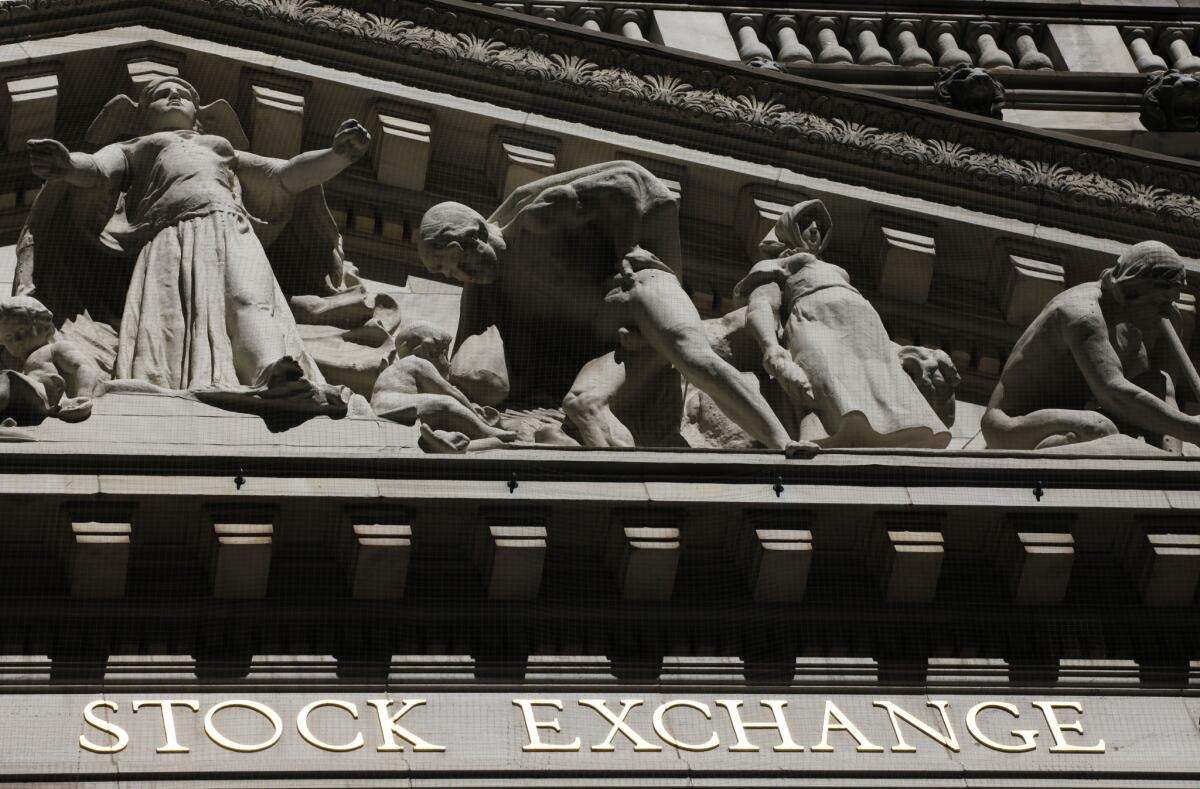Stocks slide on trade-war worries

- Share via
Stocks on Wall Street wobbled Tuesday before ending with broad losses as anxious investors shifted money to U.S. government bonds, gold and other assets that traditionally are seen as havens.
The selling, which erased some of the market’s gains from Monday’s strong rally, came as long-term bond yields once again fell below short-term ones, a rare phenomenon that has heralded previous recessions.
Worries that the costly trade war between the United States and China will drag the U.S. economy into a recession have increased demand for U.S. government bonds. On Tuesday, that pulled the yield of the 10-year Treasury below that of the two-year Treasury. This so-called inversion of the yield curve has happened before the last five recessions.
“You have a symptom in the inversion, but really the cause of that symptom is the tariffs and the trade war causing a global slowdown,” said Dan Heckman, national investment consultant at U.S. Bank Wealth Management.
The Standard & Poor’s 500 index fell 9.22 points, or 0.3%, to 2,869.16. The benchmark index has fallen for the last four weeks in a row. The Dow Jones industrial average slid 120.93 points, or 0.5%, to 25,777.90. The Nasdaq fell 26.79 points, or 0.3%, to 7,826.95.
Smaller-company stocks bore the brunt of the selling, which sent the Russell 2000 index down 19.96 points, or 1.4%, to 1,456.04.
The major U.S. indexes are on track for losses of 3% or more this month, which has been a volatile one for the market.
Early on Tuesday the indexes appeared poised to extend the gains from Monday’s rally. But they soon turned lower as the inversion between long-term and short-term bond yields became more worrisome.
The yield on the 10-year Treasury note tumbled to 1.48% from 1.54%. It briefly dropped to 1.468%. At the same time, the yield on the two-year Treasury declined to 1.51%, down from 1.53% the day before. At one point it climbed as high as 1.54%.
When the yield curve inverted earlier this month for the first time since 2007, it led to a broad market sell-off.
Although the yield-curve inversion has been a good indicator of a coming recession in the past, it usually means a recession is at least a year off, said J.J. Kinahan, chief market strategist for TD Ameritrade.
“Just because it happened doesn’t mean the world ends,” he said. “We do still have the China tariff situation, which many believe, if settled quickly, could also lead to a quick economic expansion.”
Financial-sector stocks fell the most as bond prices surged, which pulled yields sharply lower. Declining yields mean lower profits for banks because they pull down interest rates on mortgage and other loans. JPMorgan Chase shares fell 1.1%. Citigroup shares dropped 1.7%.
The losses mark a shift in investor sentiment. On Monday, tentative optimism about the potential for progress in the trade war drove a broad market rally.
Last week, the trade conflict escalated again with the United States and China threatening new tariffs on each other’s goods, triggering a sharp sell-off in global markets. On Monday the market recouped some of those losses after President Trump said his negotiators had received encouraging calls from China over the weekend. Traders drew encouragement from the development, even though China’s foreign ministry denied knowledge of any such calls.
Market watchers are becoming increasingly circumspect about what lies ahead. UBS, the world’s largest wealth manager, recommended that customers reduce their exposure to stocks, the first time it has done so since the depths of Europe’s debt crisis in 2012.
“What’s still rattling investors is the reality that the trade war is dragging on and, despite discussions about an upcoming meeting, the market is losing confidence that perhaps that might take place,” Heckman said.
Healthcare stocks and several big retailers also fell Tuesday. Humana slid 5.8%. Gap sputtered 4.9%.
Safer-play sectors such as utilities and real estate were among the gainers. Exelon rose 1.2%.
Gold, also seen as a haven, climbed $14.70 to $1,541 an ounce. Gold producer Barrick Gold’s stock rose 3.1%.
Philip Morris International slid 7.8% after the international seller of Marlboro cigarettes confirmed it is in merger talks with Altria Group more than a decade after the tobacco companies split. Altria has focused on cigarette sales in the United States. Philip Morris said that there is no guarantee of success in what would be an all-stock deal. Altria shares dropped 4%.
J.M. Smucker sank 8.2% after turning in weak results.
Johnson & Johnson rose 1.4% after a ruling against the company in an Oklahoma opioid case wound up being less than investors were expecting.
Troubled pizza company Papa John climbed 9.5% after naming a new CEO.
In commodities trading, benchmark crude oil rose $1.29 to $54.93 a barrel. Brent crude oil, the international standard, rose 81 cents to $59.51 a barrel. Wholesale gasoline rose 3 cents to $1.65 a gallon. Heating oil climbed 3 cents to $1.82 a gallon. Natural gas fell 3 cents to $2.20 per 1,000 cubic feet.
More to Read
Inside the business of entertainment
The Wide Shot brings you news, analysis and insights on everything from streaming wars to production — and what it all means for the future.
You may occasionally receive promotional content from the Los Angeles Times.










